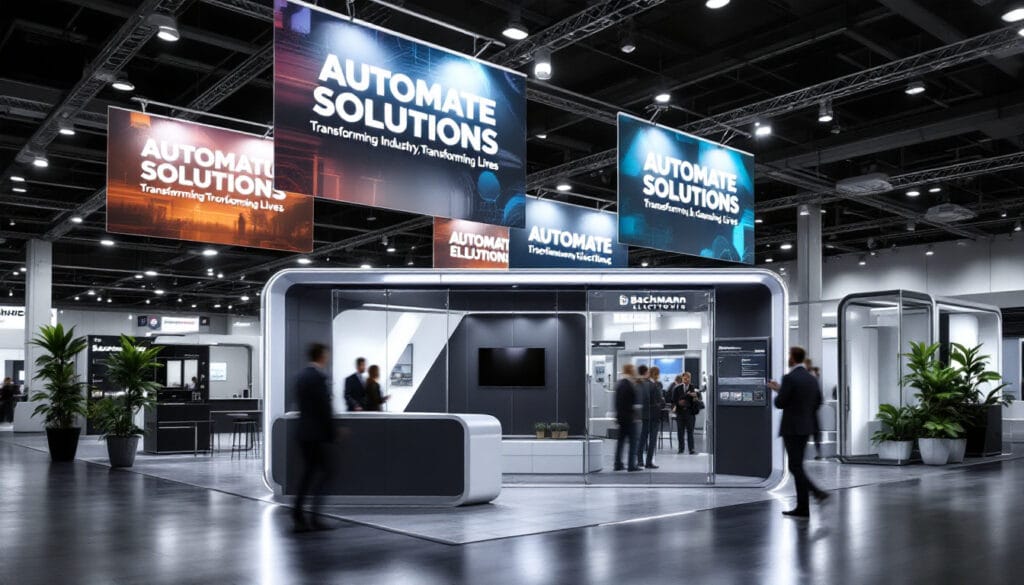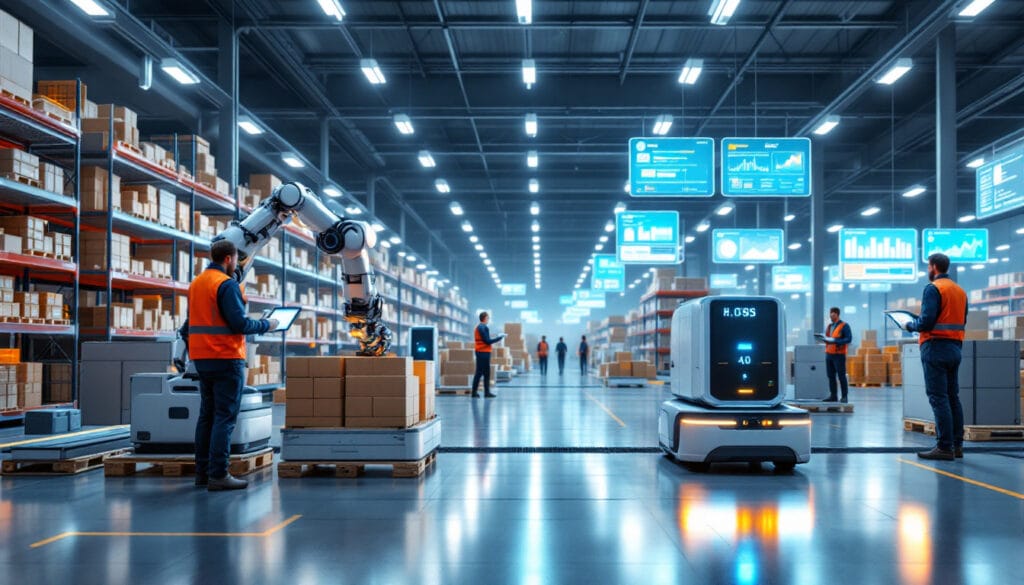The digital revolution is redefining the contours of modern supply chains. Businesses must adapt to remain competitive in this ever-changing environment. The integration of advanced technologies is becoming essential to optimize processes.
In this context, data plays a central role, enabling in-depth analysis and informed decision-making. Optimizing flows ensures maximum efficiency, while the resilience of systems guarantees the continuity of operations in the face of disruptions. Adopting a proactive approach to these challenges is essential for thriving in the era of Industry 4.0.

Table des matières
Togglewhat is industry 4.0 and why is tesla preparing for it
Industry 4.0 represents the fourth industrial revolution, characterized by the integration of advanced digital technologies into manufacturing processes. For Tesla, this transition is crucial to maintaining its leadership position in the automotive sector and meeting the growing expectations for innovation and sustainability. By adopting the principles of Industry 4.0, Tesla aims to improve efficiency, flexibility, and quality in its productions, while reducing costs and accelerating the time-to-market of new models.
Tesla’s preparation for the era of Industry 4.0 involves the integration of technologies such as artificial intelligence, the Internet of Things (IoT), advanced robotics, and smart production systems. These innovations enable better management of production flows, predictive maintenance of equipment, and increased vehicle customization for consumers. Furthermore, adopting these technologies helps to strengthen the resilience of supply chains, an essential aspect in a global and often unpredictable context.
By preparing for Industry 4.0, Tesla is not only looking to optimize its internal operations, but also to influence the standards of the global automotive industry. This proactive approach allows it to stay at the forefront of technology, anticipate market trends, and respond agilely to future challenges. This strategy is supported by a strong culture of innovation and continuous investment in research and development, positioning Tesla as a model to follow in the digital age.
what technologies is tesla adopting for industry 4.0
To realize its vision of Industry 4.0, Tesla integrates several cutting-edge technologies into its manufacturing and management processes. One of the key technologies is artificial intelligence, which allows for the analysis of vast volumes of data in real-time to optimize production and anticipate maintenance needs. With AI, Tesla can automatically adjust manufacturing parameters, thereby reducing errors and increasing operational efficiency.
The Internet of Things (IoT) also plays a crucial role in Tesla’s strategy. IoT sensors installed on production lines collect essential data about the condition of machines and working conditions. This information is then used to improve process monitoring, detect anomalies, and prevent failures before they occur. IoT also enables better traceability of components throughout the supply chain, ensuring consistent quality of produced vehicles.
Advanced robotics is another key component of Tesla’s approach. Collaborative robots (cobots) work alongside human operators, performing repetitive and complex tasks with great precision. This human-robot collaboration not only increases productivity but also frees workers from tedious tasks, allowing them to focus on more creative and value-added aspects. Furthermore, Tesla’s robots are programmable and can be quickly reconfigured to adapt to different production lines and new vehicle models.
Lastly, smart production systems integrate all these technologies to create a highly automated and interconnected manufacturing environment. These systems enable real-time resource management, dynamic planning, and continuous process optimization. By integrating these technologies, Tesla enhances its ability to innovate, respond quickly to market demands, and maintain high-quality standards.
how does industry 4.0 impact tesla’s financial rating
The integration of Industry 4.0 at Tesla has direct repercussions on its financial rating, strengthening investors’ confidence and improving its position in financial markets. By optimizing its production processes through advanced technologies, Tesla manages to reduce its operating costs and increase its profit margin. This increased efficiency translates into more robust financial performance, which is viewed positively by rating agencies and financial analysts.
The improvement of resilience in supply chains due to Industry 4.0 also plays a crucial role in stabilizing Tesla’s revenues. By minimizing production interruptions and ensuring operational continuity, Tesla reduces financial risks associated with delays and component shortages. This results in better revenue predictability and decreased volatility in financial performance, contributing to a higher rating.
Moreover, continuous innovation and the rapid adoption of new technologies position Tesla as a dynamic and forward-looking player in the automotive industry. This positive perception enhances investor confidence in Tesla’s ability to sustain its growth and overcome future challenges. Consequently, Tesla enjoys easier access to funding under favorable conditions, which may be reflected in an improved financial rating.
Initiatives in sustainability and social responsibility, made possible through Industry 4.0, also contribute to the improvement of Tesla’s financial rating. By adopting more environmentally friendly production practices and reducing its carbon footprint, Tesla meets the expectations of investors concerned about the environmental impact of companies. This strengthens Tesla’s reputation and can lead to a better perception of its stability and long-term vision, important factors considered by rating agencies.
what are tesla’s competitive advantages due to industry 4.0
The adoption of Industry 4.0 provides Tesla with several significant competitive advantages, allowing it to stand out in an increasingly competitive automotive market. One of the main advantages is Tesla’s ability to innovate rapidly and launch new vehicle models with greater agility than its competitors. Through smart production systems and the flexibility of its manufacturing lines, Tesla can adjust and reconfigure its production processes in record time to meet new market demands.
Another crucial advantage lies in the optimization of product quality. The integration of artificial intelligence and IoT technologies enables Tesla to monitor and control every step of production with unmatched precision. This results in reduced manufacturing defects, improved vehicle reliability, and increased customer satisfaction. Superior quality not only helps retain customers but also strengthens Tesla’s reputation as synonymous with excellence and reliability.
The customization of vehicles is also a key area where Tesla benefits from Industry 4.0. Advanced technologies allow for a wider range of more tailored customization options better suited to consumer preferences. This ability to offer bespoke vehicles enhances the attractiveness of Tesla models and meets the growing demand from customers seeking unique and personalized products.
Finally, the operational efficiency achieved through Industry 4.0 allows Tesla to reduce its production costs and improve its profit margins. This efficiency translates into more competitive prices for consumers while maintaining high profitability for the company. Tesla’s ability to offer high-quality products at attractive prices allows it to position itself advantageously against its competitors, thus attracting a larger customer base and consolidating its market share.
how does tesla manage the challenges of transitioning to industry 4.0
The transition to Industry 4.0 is not without challenges, and Tesla must navigate various obstacles to successfully carry out this transformation. One of the main challenges is the high initial investment required to adopt new technologies. Implementing advanced systems of artificial intelligence, robotics, and IoT requires significant capital expenditures. However, Tesla offsets these costs through efficiency gains and long-term savings achieved through automation and process optimization.
Another major challenge concerns the training and skill development of employees. The integration of sophisticated technologies demands a skilled workforce capable of managing and maintaining these systems. Tesla therefore invests heavily in training and professional development programs to ensure that its employees possess the necessary skills. This proactive approach not only facilitates the transition but also creates a more innovative and collaborative work environment.
Cybersecurity is also a key concern in the context of Industry 4.0. The increasing interconnectivity of production systems exposes Tesla to greater risks of cyber attacks and data breaches. To mitigate these risks, Tesla implements robust security measures, including advanced firewalls, intrusion detection systems, and strict security protocols. Protecting sensitive data and securing production systems are priorities to ensure operational continuity and the trust of customers and investors.
Lastly, managing organizational change represents a significant challenge. The transition to Industry 4.0 requires an adaptation of internal processes, organizational structures, and corporate culture. Tesla addresses this challenge by fostering an innovation culture and actively engaging employees in the transformation process. Transparent communication and strong leadership are essential to overcoming resistance to change and ensuring a smooth adoption of new technologies.
what are tesla’s future prospects in industry 4.0
The future prospects for Tesla in Industry 4.0 are promising and aligned with global technological trends. By continuing to invest in emerging technologies, Tesla is well-positioned to remain at the forefront of innovation in the automotive sector. The expansion of artificial intelligence and machine learning will enable Tesla to develop even more advanced solutions for autonomous driving, energy management, and optimization of vehicle performance.
Moreover, the rise of the Internet of Things offers Tesla the opportunity to create ultra-connected vehicles and integrated smart ecosystems. These vehicles will be able to communicate with each other and with surrounding infrastructures, thus improving safety, efficiency, and user experience. This increased connectivity paves the way for new features and services, enhancing the attractiveness of Tesla products in the global market.
Strategic collaborations and technological partnerships will also play a key role in Tesla’s future initiatives. For example, alliances with companies specializing in 5G or advanced robotics can accelerate the development and deployment of Industry 4.0 technologies. These partnerships allow Tesla to access new skills and complementary resources, thus facilitating innovation and the implementation of complex projects.
Finally, sustainability and resource optimization will continue to be at the heart of Tesla’s strategies. Industry 4.0 enables better resource management, waste reduction, and improved energy efficiency in production processes. These advances contribute not only to reducing Tesla’s carbon footprint but also to creating long-term value for shareholders and stakeholders. By adopting a sustainable and innovative approach, Tesla positions itself for a prosperous future in the era of Industry 4.0.
what influence does industry 4.0 have on tesla’s supply chain
The adoption of Industry 4.0 has a significant influence on Tesla’s supply chain, enhancing its resilience, transparency, and efficiency. Through the integration of technologies such as the Internet of Things (IoT) and artificial intelligence, Tesla can monitor in real-time each link in its supply chain. This allows for the rapid detection of anomalies, forecasting supply needs, and optimizing inventory levels, thus reducing storage costs and minimizing the risk of shortages.
The increased visibility of the supply chain also allows Tesla to strengthen its collaboration with suppliers. By sharing real-time data, Tesla and its partners can coordinate material flows and production schedules more effectively, ensuring optimal synchronization and reducing delivery times. This close collaboration contributes to better risk management and greater flexibility in the face of demand fluctuations and market disruptions.
Furthermore, the use of artificial intelligence for predictive analytics allows Tesla to anticipate market trends and adjust its supply chain accordingly. For example, by analyzing sales data and consumer behaviors, Tesla can predict which components will be needed for future vehicle models, thus optimizing supply and reducing time-to-market.
Finally, Industry 4.0 facilitates the adoption of sustainable practices within Tesla’s supply chain. By optimizing logistics processes and reducing waste, Tesla can minimize its environmental impact while improving operational efficiency. This sustainable approach enhances Tesla’s reputation as a responsible and innovative company, thus attracting partners and customers who are environmentally conscious.





